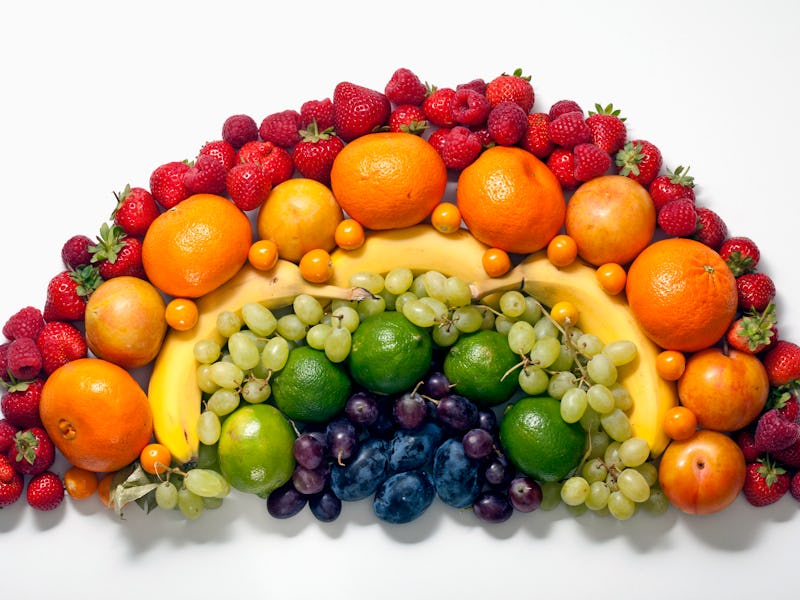This colorful diet is linked to better brain health and memory
Eat the rainbow to lower chances of cognitive decline.

Children of the 1990s may remember the irresistible pull of an iconic ad slogan in its early days, perhaps in between VH1 countdowns and episodes of Whose Line is it, Anyway? Amidst a cascade of raining candy, Skittles urged us to “taste the rainbow.”
This adage takes on a whole new meaning in the context of a new study conducted by Harvard researchers, who published their findings Wednesday in the journal Neurology.
Their work suggests flavonoids — compounds found in an array of our most colorful fruits and veggies — play a role in protecting against cognitive decline. (Unfortunately, despite their colorful array, Skittles aren’t particularly rich in antioxidants).
In the study, people who ate the most flavonoids (over 600 milligrams per day) were almost 20 percent less likely to have higher scores on cognitive decline surveys, compared to peers who ate the least flavonoids. Flavonoids are found in foods like oranges, pears, and celery.
Lead study author Tian-Shin Yeh is a post-doctoral research fellow in epidemiology and nutrition at Harvard’s School of Public Health. Her team was “somewhat surprised at the strength of the association” between flavonoids and protection against cognitive decline “even with diet several decades before the assessment of cognitive function,” Yeh tells Inverse.
HOW THIS AFFECTS LONGEVITY — Cognitive decline is a common part of aging, yet we don’t have effective treatments for dementia, Alzheimer's diseases, or other illnesses that erode our memories and mental function. People with cognitive decline lose their ability to care for themselves sooner and can die earlier.
In broad strokes, a nutrient-rich diet is an important part of staying healthy as we age. But studies like this one — spanning thousands of lives over time and honing in on one association between food and brain health — allow us to target efforts at balancing nutrition. Many factors affect our brain as we age, but diet is a relatively inexpensive and easy way to decrease risk.
“People in our study who did the best over time ate an average of at least half a serving per day of flavonoid-rich foods,” Yeh says.
Citrus fruit and tea are high in flavonoids, a kind of antioxidant that may protect against cognitive decline.
WHY IT'S A HACK — By now, most of us know more fruits and vegetables lead to better… well, everything. It’s hard to understate how much nutrition affects our aging process. Foods containing flavonoids seem to play a specialized role in keeping your brain sharp and your memories straight.
These foods are high in antioxidants, which means they can fight oxidative stress. Oxidative stress is a bodily phenomenon when there’s an imbalance of free radicals and antioxidants.
Molecules like free radicals are needed, to some degree, in our cells: They can help make some parts of cells and contribute to fighting pathogens. But too many — they’re often byproducts of pollutants, cigarette smoke, or alcohol — can build up faster than our cells can dispose of them. Inflammation, cancer, mental stress, and aging among other factors, can also generate free radicals.
Flavanoids exhibit antioxidant activity. This means they can help prevent free radicals from being made, contribute to “scavenging” for them, and support the cellular defense system against them.
In the study, these brightly-hued foods packed in the flavonoids and were associated with fewer signs of cognitive decline:
- Strawberries
- Oranges
- Grapefruits
- Citrus juices
- Apples
- Pears
- Celery
- Peppers
- Bananas
Many kinds of apples, for example, have around 100 milligrams of flavonoids each. One kind of flavonoid, called flavones, seemed to have the strongest effect on perceived cognitive decline — these are found in oranges, peppers, celery, and (here’s a twist) red wine.
Colorful fruits are associated with better brain health.
Interestingly enough, one of the largest portions of flavonoids for both groups came from tea.
SCIENCE IN ACTION — This paper incorporates two larger, long-term studies that gathered detailed information about the diets of thousands of Americans between 1984 to 2006.
Overall, Yeh and colleagues analyzed data representing:
- 49,493 women between the ages of 30 and 55
- 27,842 men between the ages of 40 and 75
As part of the larger studies, participants were given detailed questionnaires about their diet and lifestyle either about once every four years or once every two years.
Twice — in either 2008 and 2012 or 2012 and 2014 — participants answered questions on what is called “subjective cognitive decline.” This involved answering questions like:
- “Do you have more trouble than usual remembering a short list of items, such as a shopping list?”
- “Do you have more trouble than usual following a group conversation or a plot in a TV program due to your memory?”
These questions were scored on a point system. These surveys were meant to evaluate one’s own perception of their brain. It’s not a bias-free method, but it can also serve to capture subtle changes that one might only pick up themselves, the study team explains.
The scientists also compared how many foods high in flavonoids people reported eating, and compared it with their self-reported cognitive surveys later in life. They accounted for a number of other factors that could influence cognitive decline (factors like income and family medical history) so that flavonoids could stand alone.
Ultimately, the team concludes that diets rich in flavonoids help maintain a healthy brain, finding higher intake in total was associated with lower odds of subjective cognitive decline.
That’s a great excuse for a strawberry, orange, banana smoothie.
HACK SCORE OUT OF 10 — 🍓🍎🍊🍌🍋🍐🍏/10